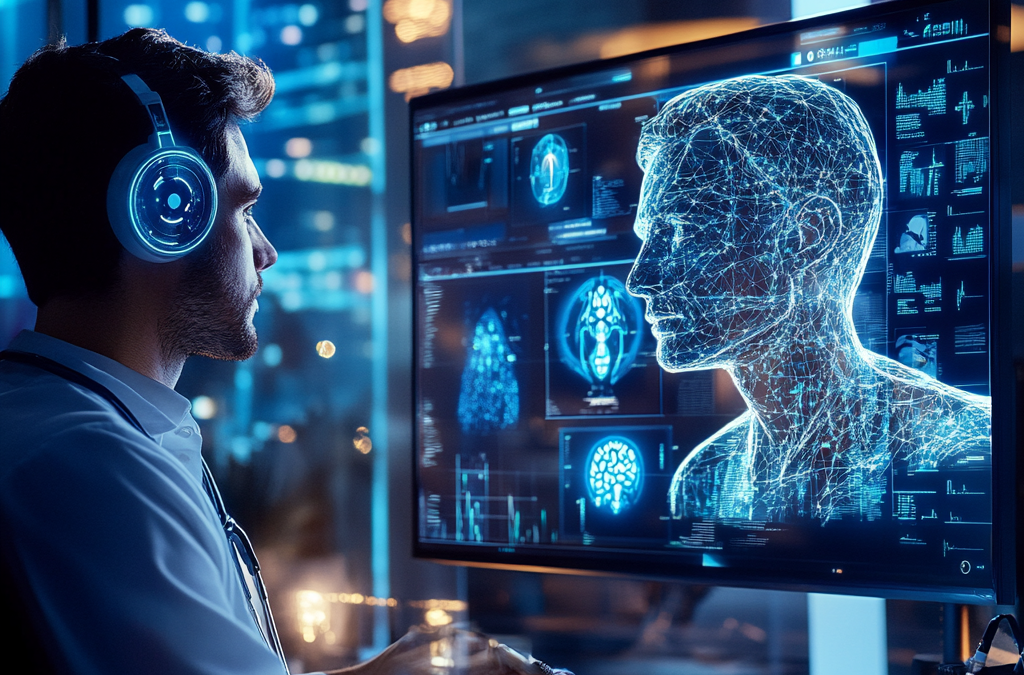Introduction
Biofeedback therapy has long been a cornerstone of mind-body healing, helping individuals regulate their physiological responses to stress, pain, and mental health conditions. However, the field is now undergoing a technological revolution, with artificial intelligence (AI) transforming how biofeedback is delivered, personalized, and optimized.
From AI-powered wearable devices to machine-learning algorithms that adapt therapy in real-time, cutting-edge technology is making biofeedback more accessible, efficient, and effective than ever before. This article explores how AI is reshaping biofeedback therapy, the latest advancements in high-tech mind-body healing, and what the future holds for this rapidly evolving field.
The Basics of Biofeedback Therapy
Biofeedback therapy is a technique that enables individuals to gain control over involuntary bodily functions by providing real-time data on physiological processes such as:
- Heart rate variability (HRV)
- Muscle tension (EMG)
- Brain activity (EEG)
- Skin conductance (GSR)
- Respiration patterns
By monitoring these signals and learning how to adjust them through guided exercises, individuals can reduce stress, manage chronic pain, and improve mental well-being.
How AI is Transforming Biofeedback Therapy
1. AI-Powered Personalization
Traditional biofeedback therapy required trained professionals to analyze data and guide patients. Today, AI-driven algorithms can process real-time physiological data and instantly provide personalized recommendations for breathing exercises, muscle relaxation techniques, or cognitive strategies.
For example, adaptive biofeedback platforms use machine learning to analyze an individual’s unique stress response patterns and customize therapy sessions for maximum effectiveness.
2. Wearable Technology and Smart Sensors
Advancements in AI-integrated wearables have made biofeedback therapy more accessible to the general public. Devices like:
- WHOOP and Oura Ring (HRV tracking)
- Muse Headband (brainwave neurofeedback)
- BioStrap (respiration and recovery monitoring)
These tools collect and analyze vast amounts of biometric data, providing real-time feedback and AI-driven insights on how to optimize relaxation, sleep, and stress management.
3. AI and Neurofeedback: Training the Brain in Real Time
Neurofeedback, a subset of biofeedback that focuses on brainwave activity, has seen significant advancements with AI integration. AI-powered neurofeedback systems, such as BrainCo and Neurable, analyze EEG patterns and deliver instantaneous, precise adjustments to optimize focus, cognitive function, and emotional regulation.
This has been particularly beneficial for treating conditions such as:
- ADHD
- Anxiety disorders
- PTSD
- Chronic stress and burnout
4. Virtual Reality (VR) Meets AI-Enhanced Biofeedback
The combination of AI-driven biofeedback and virtual reality (VR) has created immersive therapeutic experiences for stress relief, pain management, and mental wellness.
For example:
- AI-driven VR meditation programs adjust real-time visuals and soundscapes based on physiological responses.
- Virtual environments can simulate stressors while AI coaches guide individuals through relaxation techniques in real time.
Companies like Healium and SyncThink are pioneering AI-powered VR biofeedback therapy for mental health and peak performance training.
5. AI-Driven Predictive Analytics for Preventative Health
AI algorithms can analyze long-term biofeedback data to predict and prevent health issues before they arise. By identifying trends in HRV, muscle tension, or respiration, AI-powered systems can detect:
- Early signs of chronic stress
- Patterns linked to cardiovascular risk
- Neurological changes associated with cognitive decline
This predictive capability makes AI-enhanced biofeedback an essential tool in preventative healthcare and long-term wellness optimization.
Benefits of AI-Enhanced Biofeedback Therapy
- Greater Accessibility – AI-driven biofeedback tools are available through wearable devices, mobile apps, and cloud-based platforms, making therapy more widely accessible than traditional in-clinic sessions.
- Real-Time Adaptability – Unlike static programs, AI adjusts exercises and techniques in real time, ensuring more effective and individualized therapy.
- Higher Engagement and Compliance – Gamification elements in AI-powered biofeedback apps make therapy more engaging, increasing patient adherence to training protocols.
- Remote Monitoring and Telehealth Integration – AI-enabled platforms allow practitioners to track progress remotely, offering virtual support for long-term mind-body health.
Challenges and Considerations
While AI is revolutionizing biofeedback therapy, there are challenges that must be addressed:
- Data Privacy Concerns – The collection and processing of biometric data raise ethical questions about data security and user privacy.
- Algorithm Bias – AI systems must be trained on diverse populations to ensure personalized recommendations are effective for all individuals.
- Integration with Traditional Therapy – AI should be viewed as a complementary tool rather than a replacement for trained biofeedback practitioners.
The Future of AI-Powered Biofeedback Therapy
The future of AI in biofeedback therapy looks promising, with innovations such as:
- AI-powered chatbots for stress management
- Advanced neuroadaptive systems for cognitive performance
- Integration with smart home technology to create real-time stress-reducing environments
With continued advancements in machine learning, biometric tracking, and digital health technology, AI will play an increasingly significant role in shaping the future of mind-body medicine and holistic health care.
Conclusion
AI is revolutionizing biofeedback therapy, making it smarter, more personalized, and widely accessible. From adaptive wearables to AI-driven neurofeedback, cutting-edge technology is transforming how individuals optimize mental resilience, pain management, and stress reduction.
As AI continues to evolve, its role in mind-body healing will expand, offering powerful tools to enhance self-regulation, peak performance, and overall well-being. By embracing AI-powered biofeedback, individuals and healthcare providers alike can unlock new potentials for precision-driven, data-backed holistic healing.
The future of biofeedback therapy isn’t just high-tech—it’s intelligent, adaptive, and designed to empower individuals to take control of their health like never before.

